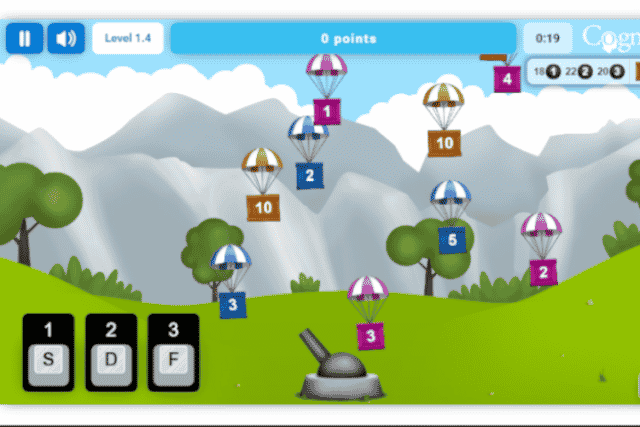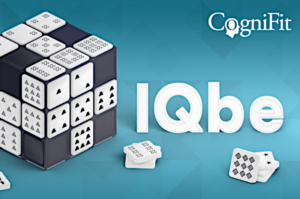
Minus Malus – Survive A Barrage of Subtraction
Minus Malus is another unique brain game that will stimulate your Working Memory, Processing Speed, and Shifting abilities. Let’s take a closer look at how the game works and how it benefits your mind.
Minus Malus Game
This game might look similar to Numbers Line. But instead of dealing with different math equations, this one only deals with subtraction.
All you have to do is use your mouse to tilt in the direction of whatever falling crate you want to target. Then, you choose S, D, or F on your keyboard. These are worth 1, 2, and 3 points respectively. So, if you want to shoot down a crate with a value of 10, you would need to press F/F/F/S.
There is also a tracker in the top right corner that has a crate limit (how many times you can have a box hit the ground) as well as a bullet counter for each S/D/F. This means that eventually, you’ll be forced to choose which boxes you can shoot out of the sky based on what ammo you have left.
And as the game gets harder, there are more obstacles. This includes faster fall times, more boxes, and the need to be more careful with your bullets.
Processing Speed
Processing speed is one of the most important skills in learning, academic performance, intellectual development, reasoning, and experience.
It’s the time it takes a person to do a mental task. It is also related to the speed at which a person can understand and react to the information they receive, whether it be…
- visual (letters and numbers)
- auditory (language)
- movement
Slow or poor processing speed is not related to intelligence, It just means that some tasks could be more difficult than others, like reading, doing math, listening and taking notes, or holding conversations. It may also interfere with executive functions, as a person with slow processing speed will have a harder time planning, setting goals, making decisions, starting tasks, paying attention, etc.

Shifting
Cognitive shifting is the brain’s ability to adapt to new behavior, thoughts, or unexpected events. It’s our ability to see that something isn’t working and then make the appropriate changes to adapt to new situations.
Mental shifting is the main component in cognitive flexibility. In fact, they are often confused as the same idea. However, cognitive flexibility refers to the ability to adapt to a change, while mental shifting is the process that makes it possible to adapt to the change.
Characteristics of someone with strong cognitive shifting may be the following:
- adapt quickly to changes or new situations.
- tolerate changes that may occur when problem-solving or carrying out a task. It allows you to create alternative solutions.
- easily able to transition from one activity to another and know how to carry themselves properly in every situation.
- capture various dimensions of reality, see from different points of view, and recognize hidden relationships, which allows them to easily find different solutions to the same problem.
- better tolerate errors and changes, are able to think about a situation from another person’s point of view and are easily able to find compromises.
Working Memory
Working memory, according to Baddley and Hitch, is made up of three systems, which include components for information storage and processing.
- The central executive system: Works like an attention supervision system that decides what we pay attention to and how to organize a sequence of operations that we will need to do to do an action.
- The phonological loop: manage and retain spoken and written material in our memory.
- Visual-spatial agenda: manage and retain visual information.
- Episodic Buffer: integrates information from the phonological loop, viso-spatial sketchpad, long-term memory and the perceptive entrance into a coherent sequence.
It’s also important to remember that everyone has limits (5 to 9 elements at a time). The information is also always updated
Minus Malus Conclusion
As always, this CogniFit game is simple and fun in its base idea but can push your brain to some serious cognitive levels as you progress. And since the ideal brain exercise regime is 3 times a week and 20 minutes per session, you can easily add it in and see if you like it. Or, you can explore other games that offer similar brain targeting if you want to switch things up.













